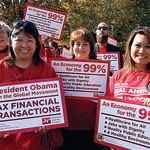As part of the Certificate Program in Women’s Global Health Leadership, we are pleased to announce the Fall 2014 courses "Global Women’s Health Movements," "The Growth Imperative, Global Ecology, and Women’s Health," and "Debt, Crisis, and Women’s Health," co-sponsored by National Nurses United and Rutgers, The State University of New Jersey. The courses will be offered online during the Fall Semester of 2014. Classes begin September 2, 2014.
Full-tuition scholarships are available for NNU members interested in building global solidarity with those who share RN values of caring, compassion, and community. To apply for a full-tuition scholarship for a course, please submit a short essay (250 to 500 words) describing how the topic of the course will inform your RN patient advocacy. NNU members may apply for a scholarship for more than one course. A separate essay is required for each course for which an RN seeks a scholarship.
All interested scholarship applicants should submit their essay via email to
If you have any questions, please contact the Certificate Program Administrative Coordinator, Janelle Fine, at (510) 273-2241 or
The certificate program matters for nurses because it is the only academic program in the country that honestly assesses the rapidly changing socioeconomic landscape of healthcare in the United States and globally from the standpoint of bedside RNs. Classes prepare nurses to identify and confront social, economic, political, and environmental forces that place their jobs, livelihoods, communities, and planet in jeopardy.
Click here to read more about the certificate program.
Class Descriptions:
Global Women’s Health Movements (01:988:407)
 This course identifies the global institutions and policies that most impact health. Students will discern how women’s non-governmental organizations have attempted to transform existing institutions and policies of global health governance such that people everywhere can lead healthier and more dignified lives. The course encourages students to forge new ground by drawing connections among institutions of global governance and women’s health by examining how women’s organizations around the world have fought to actualize universal access to healthcare.
This course identifies the global institutions and policies that most impact health. Students will discern how women’s non-governmental organizations have attempted to transform existing institutions and policies of global health governance such that people everywhere can lead healthier and more dignified lives. The course encourages students to forge new ground by drawing connections among institutions of global governance and women’s health by examining how women’s organizations around the world have fought to actualize universal access to healthcare.
The Growth Imperative, Global Ecology, and Women’s Health (01:988:409)
 In the last quarter century, the premise of the possibility of endless growth for the purpose of unlimited capital accumulation has met the inevitable challenges of resource exhaustion on a global scale and its human consequences. Markets and technological innovation are inadequate to solve the resulting environmental crises. Health consequences include illness caused by toxic industrial byproducts, injury from resource extraction processes such as nuclear fission and deep–water oil drilling, manifold health hazards of violent conflict over control of scarce resources in postcolonial states, and dangers that attend climate change. This course will address externalized business costs paid in the currency of human health.
In the last quarter century, the premise of the possibility of endless growth for the purpose of unlimited capital accumulation has met the inevitable challenges of resource exhaustion on a global scale and its human consequences. Markets and technological innovation are inadequate to solve the resulting environmental crises. Health consequences include illness caused by toxic industrial byproducts, injury from resource extraction processes such as nuclear fission and deep–water oil drilling, manifold health hazards of violent conflict over control of scarce resources in postcolonial states, and dangers that attend climate change. This course will address externalized business costs paid in the currency of human health.
Debt, Crisis, and Women’s Health (01:988:410)
 Growing national debt has become a feature of increasing numbers of nations over the past 60 years, heightening dependence on international financial institutions and restricting the sphere of freedom of national policy makers. Healthcare provision has been subjected to severe cuts as nations struggle to meet their debt obligations and stabilize their economies. Framing ongoing global economic crisis as a consequence of excess rather than scarcity, this course unsettles the conventional moral calculus of credit and debt, exploring the relationship between debt and economic crisis, and examining the impacts of austerity policies on women’s health. In particular, the course analyzes who suffers for the sake of debt repayment and the magnitude of that suffering in highly leveraged societies.
Growing national debt has become a feature of increasing numbers of nations over the past 60 years, heightening dependence on international financial institutions and restricting the sphere of freedom of national policy makers. Healthcare provision has been subjected to severe cuts as nations struggle to meet their debt obligations and stabilize their economies. Framing ongoing global economic crisis as a consequence of excess rather than scarcity, this course unsettles the conventional moral calculus of credit and debt, exploring the relationship between debt and economic crisis, and examining the impacts of austerity policies on women’s health. In particular, the course analyzes who suffers for the sake of debt repayment and the magnitude of that suffering in highly leveraged societies.
What are RNs saying about taking courses in the certificate program?
Ashley Fauls, an RN who received a scholarship, shares her valuable experience of taking courses in the certificate program:
"With the Women’s Global Health Leadership Program, NNU has tapped into something strikingly unique [and] beautiful. As a bedside nurse, I have long felt the urge to take advocacy and care into my community, and—if the opportunity arose—to the world at large. However, the task felt so large, so encompassing, and I was at a loss of where to begin. Through the WGHL program, I have had the honor of obtaining solid education as it pertains to health disparities across racial, gender, economic, social and continental lines. I have felt waves of empowerment through the course educators’ continuous supply of relevant […] reading/viewing material, and stimulating weekly discussions and assignments. My passion for substantive nursing care has been re-kindled, and new passions are emerging on a regular basis. I have been personally and professionally challenged by this learning, and have been astonished by the number of family, friends, and colleagues who are willing, and even eager, to sit, listen, and learn from this essential information. To any nurse considering participation in the WGHL program, I encourage you to surrender to the nudge and jump in!"
Another scholarship recipient, Jeff Breslin, RN, agrees about the value of courses in the certificate program:
"My name is Jeff Breslin, and I am a Registered Nurse in Michigan and an advocate for my patients both inside and outside the hospital. I saw an opportunity through this certificate program to expand my knowledge and therefore my ability to advocate for my patients and my profession. I just finished the first two classes in the seven class series and I have to say they were outstanding. The course content and presentation helped to articulate many of the things that I already have seen in my practice as well as delve into new areas that every nurse/patient advocate should be aware of. I looked forward every week to the rich discussion on the discussion boards. The class was made up of many different people from varying backgrounds, which allowed full exploration of the topics at hand. I found myself not only learning but also helping teach some of the other students who have not had as much exposure to healthcare and women’s health issues. I look forward to the next classes in this program and would recommend these to every nurse. This will help take their advocacy to the next level with very informed, very educated information that will help improve their effectiveness not only at the bedside but also in their role as an advocate."
Jana Siu, RN, a scholarship recipient, shares her experience of taking classes in the certificate program:
"What is amazing about the Women’s Global Health Leadership courses is that they teach you social structures from a grand scale to the individual level, social structures that perpetuate global injustices and human rights violations. Instead of just knowing that these things happen, we learn the 'why’s' and the 'how’s'. Through that, I was able to truly be awakened and gain insight so that I could see solutions for our community. Seeing solutions is crucial to being engaged while living in a society where we are being driven into apathy with the overwhelming amount of information [with which we are bombarded.] At first I was afraid to take these classes because I will admit that I am not as well-versed as I should be with current events and politics. I feel very different now. As nurses, we are given the opportunities to directly see human suffering through our patients. And yes, the power of touch and empathy are some of our strongest tools, but knowledge is even more so. Because of these classes, I have gained a wider scope of the power of my profession, which has affected the way I practice, the way I live, and the way I vote."
Another scholarship recipient, Dorothy Calvert, RN, agrees that taking courses in the certificate program is valuable for patient advocates. Her testimonial refers to The Growth Imperative, Global Ecology, and Women’s Health course:
“I have loved taking this course…. I've learned so much! Many times during the course of this class I've wished that there was a way to get this same information to all nurses. It is information that is relevant to day to day care of our patients and our own families…In the course, students are challenged to examine their own lifestyles and choices regarding consumerism and to relate those personal understandings to nursing practice and the delivery of healthcare.”
GET THE CLASS FLYERS BELOW (PDF):
Rutgers - Global Womens Health Movement